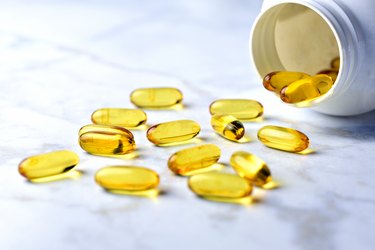
It isn't a good idea to take both turmeric and fish oil because the two supplements make the blood less likely to clot. It's possible that the additive effect might increase the risk of bleeding.
Tip
Don’t take both turmeric and fish oil. If you’re interested in the supplements, choose just one or the other.
Video of the Day
Turmeric and Fish Oil
Anticoagulant medications, which help prevent blood clots, are prescribed for people who are at risk of having a heart attack or stroke, reports MedlinePlus. While these drugs are sometimes called blood thinners, they don't actually thin the blood. Instead, they slow the body's clot-forming process, or they prevent blood cells called platelets from sticking together to form clots.
Video of the Day
An April 2012 study published in BMB Reports found that curcumin, the active ingredient in turmeric, may help prevent a blood clot by its anticoagulant effect. Due to this action, it shouldn't be taken with anticoagulant drugs or supplements, notes the Memorial Sloan Kettering Cancer Center.
Fish oil benefits include a mild anticoagulant action. The Mayo Clinic says high doses of fish oil may increase the risk of bleeding. Because of this effect, it shouldn't be taken with anticoagulant herbs, drugs or supplements.
A May 2018 study published in the Annals of Thoracic Surgery found that the anticoagulant effect of fish oil alone is weak, but that it can become noticeable when patients on prescription anticoagulants take it. The additive effect could contribute to bleeding during surgery.
Since health authorities warn against taking turmeric and fish oil with anticoagulants, it's logical to assume they shouldn't be taken together. The anticoagulant effect of each supplement would be less than that of anticoagulant medication, but it's best not to take them both at once.
Turmeric, Fish Oil and Inflammation
The Arthritis Foundation recommends both turmeric and fish oil for inflammation. It doesn't give an opinion of which supplement is more effective for the condition.
Curcumin has been used in traditional Chinese and Indian medicine to treat arthritis. Studies show it blocks inflammatory chemicals and enzymes.
Earlier research indicates curcumin has promise in providing long-term pain management for patients with osteoarthritis. One of the most interesting investigations was a small November 2012 study published in Phytotherapy Research. It only involved 45 participants, but the promising results merit notice.
In this Phytotherapy Research pilot study, researchers compared the effects of curcumin with that of the drug diclofenac on arthritis patients. The curcumin was more effective in relieving symptoms of arthritis than the medication, and no adverse side effects were associated with its use. Diclofenac, like other nonsteroidal anti-inflammatory drugs, has an array of side effects.
Fish oil also blocks anti-inflammatory chemicals in the body. According to the Arthritis Foundation, several studies show that it may be of value in reducing symptoms of osteoarthritis and rheumatoid arthritis.
All About Turmeric
Preliminary research suggests that curcumin has several benefits, reports the National Center for Complementary and Integrative Health. It may reduce the risk of heart attacks for bypass patients following surgery, as well as alleviate skin irritation from radiation treatments for breast cancer. As aforementioned, curcumin also sees wide use reducing the pain of osteoarthritis.
Read More: What Are the Benefits of Turmeric Capsules?
Curcumin is considered safe when taken by mouth or applied to the skin in recommended amounts. Higher doses might cause gastrointestinal distress. In addition to not taking the supplement with anticoagulants, it shouldn't be taken with drugs that suppress the immune system, some medications used in chemotherapy and certain other drugs.
This supplement isn't advised for people with gastrointestinal disorders, or those with a history of kidney stones. Check with your doctor before taking it.
Cancer Research UK states that curcumin isn't absorbed well. Scientists are working on developing solutions for the problem. The Mayo Clinic says that turmeric is safe at a dose of up to 8 grams per day.
- MedlinePlus: "Blood Thinners"
- BMB Reports: "Anticoagulant Activities of Curcumin and Its Derivative"
- Memorial Sloan Kettering Cancer Center: "Turmeric"
- Mayo Clinic: "Fish Oil"
- Annals of Thoracic Surgery: "Role of Fish Oil in Post-Cardiotomy Bleeding: A Summary of the Basic Science and Clinical Trials"
- Arthritic Foundation: "Turmeric"
- Phytotherapy Research: "A Randomized, Pilot Study to Assess the Efficacy and Safety of Curcumin in Patients With Active Rheumatoid Arthritis"
- Arthritis Foundation: "Fish Oil"
- National Center for Complementary and Integrative Health: "Turmeric"
- Cancer Research UK: "Turmeric"
- Mayo Clinic: "Mayo Clinic Minute: Are There Health Benefits to Taking Turmeric?"